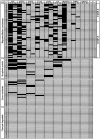Aberrant CpG island hypermethylation along multistep hepatocarcinogenesis
- PMID: 14507645
- PMCID: PMC1868296
- DOI: 10.1016/S0002-9440(10)63495-5
Aberrant CpG island hypermethylation along multistep hepatocarcinogenesis
Abstract
To determine the methylation profile of multiple tumor-related genes during multistep hepatocarcinogenesis, we investigated the methylation status of CpG islands of 9 genes, using methylation-specific polymerase chain reaction for 60 paired hepatocellular carcinoma (HCC) and non-HCC liver tissue samples, 22 dysplastic nodule (DN), 30 liver cirrhosis (LC), 34 chronic hepatitis (CH) and 20 normal liver samples. The methylation status of 9 genes was correlated to the clinicopathological findings of HCC patients. All HCC samples showed methylation of at least one gene, whereas it was shown in 72.7% of DN and 40% of LC, but was not shown in CH and normal liver samples (P < 0.001). The number of genes methylated showed a stepwise increase with the progression of stages (0 for normal liver and CH, 0.5 for LC, 1.5 for DN, and 3.7 for HCC (P < 0.001)). The genes frequently methylated in HCC were APC (81.7%), GSTP1 (76.7%), RASSF1A (66.7%), p16 (48.3%), COX-2 (35%), and E-cadherin (33.3%). COX-2, p16, RASSF1A, and TIMP-3 were not methylated in LC and CH from patients without concurrent HCC. Chronic liver diseases with concurrent HCC showed higher methylation frequencies of the tested genes, and a higher number of methylated genes than those without concurrent HCC. HCC patients with methylation of E-cadherin or GSTP1 showed poorer survival than those without (P = 0.034 and 0.043, respectively). In conclusion, our results indicated that CpG island methylation of tumor-related genes is an early and frequent event, and accumulates step-by-step during a multistep hepatocarcinogenesis. CpG island methylation of E-cadherin or GSTP1 might serve as a potential biomarker for prognostication of HCC patients.
Figures




References
-
- Bosch X, Ribes J, Borras J: Epidemiology of primary liver cancer. Semin Liver Dis 1999, 19:271-285 - PubMed
-
- : Ministry of Health and Welfare Republic of Korea: Annual Report of Cancer Registry Program in the Republic of Korea. 2000:pp 1-191 Ministry of Health and Welfare Republic of Korea Seoul
-
- Feitelson MA, Sun B, Tufan NLS, Liu J, Pan J, Lian Z: Genetic mechanisms of hepatocarcinogenesis. Oncogene 2002, 21:2593-2604 - PubMed
-
- Jones PA, Laird PW: Cancer epigenetics comes of age. Nat Genet 1999, 21:163-167 - PubMed
-
- Baylin SB, Herman JG: DNA hypermethylation in tumorigenesis: epigenetics joins genetics. Trends Genet 2000, 16:168-174 - PubMed
Publication types
MeSH terms
Substances
LinkOut - more resources
Full Text Sources
Other Literature Sources
Medical
Research Materials
Miscellaneous

